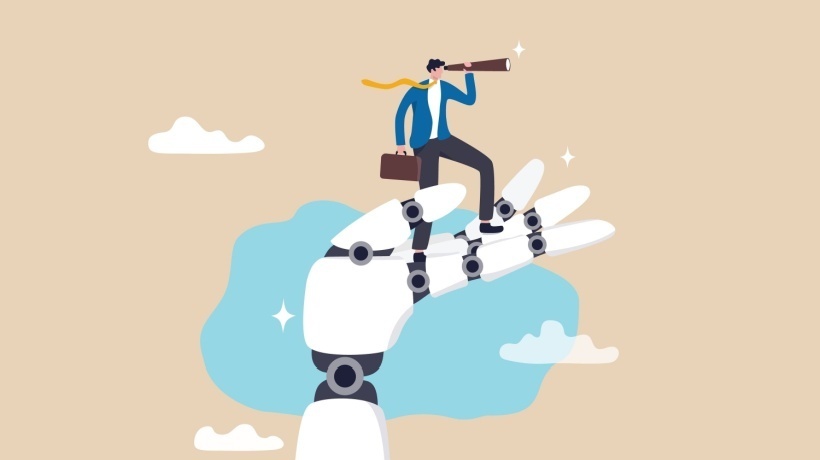AI Upskilling: The Key To Becoming Future-Ready
The office environment must constantly adapt to the rapid advancement of technology. Artificial Intelligence (AI) is a potent force that is changing the skills environment today. Although concerns about AI taking over human occupations are reasonable, a more complex picture becomes apparent. The real issue with AI is not the technology itself, but rather the skills gap it causes. In the workforce of the future, those who can comprehend, work with, and utilize AI will have a distinct advantage.
The Need For Upskilling In AI Now
A strong picture is painted by a recent study from LinkedIn and Microsoft, which shows that almost 70% of hiring managers give preference to applicants with AI skills over those with only experience. The goal of AI literacy is to enhance experience rather than to replace it. People are able to work smarter, not harder, because of its ability to automate repetitive operations, generate data-driven insights, and facilitate more efficient workflows.
Imagine working in marketing as a professional who can use AI to study consumer behavior and tailor ads to each individual to get the best results. Or, think of a medical practitioner who enhances patient care using AI-powered diagnostics. These are just a few instances of how AI may supplement human knowledge and open up new avenues in a variety of sectors.
The Success Factor Of The AI Skillset
The good news is that you can obtain this competitive advantage without being an AI engineer. Gaining proficiency in fundamental AI abilities such as data literacy, Machine Learning principles, and prompt engineering can greatly improve your value offer.
The skill of prompt engineering is developing precise and succinct instructions for AI tools so that their full potential can be realized. It is similar to drafting a comprehensive recipe for a complicated dish; the more precise and valuable the result, the better the instructions. You can make sure AI tools provide you with the data and insights you need to make wise decisions by becoming an expert in prompt engineering.
Computers can learn and develop without explicit programming; thanks to a branch of Artificial Intelligence called Machine Learning. Gaining an understanding of Machine Learning concepts enables you to analyze and derive useful insights from the data that AI generates. You'll be able to decipher AI models' complex outputs and turn them into knowledge that can be put to use.
Lastly, data literacy gives you the tools you need to effectively evaluate, interpret, and present information—a critical ability in the Big Data era. Data is what AI is all about, and being data literate helps you make sense of this always-changing information environment. You'll be able to recognize possible biases, evaluate the quality and applicability of data sets, and clearly and succinctly present your findings.
Gaining proficiency in this fundamental skillset will put you in a strong position to work with AI technologies in collaboration and take advantage of their potential to advance your career.
The Reasons Behind Gen Z's Leadership In AI Skills
Remarkably, studies point to a generational difference in the use of AI. Compared to previous generations, Gen Z, the digital natives who were born after 1995, is more inclined to accept AI tools in the workplace. Growing up in a world saturated with technology, they possess a natural comfort level with AI and its applications. This positions them for an advantage in a job market increasingly reliant on AI skills.
However, the gap isn't insurmountable. Individuals from all generations can bridge this divide through dedicated AI upskilling efforts.
The Business Potential Of AI
The advantages of AI go well beyond a person's potential job path. AI-powered solutions are causing businesses in a variety of areas, including marketing, finance, and healthcare, to see a spike in productivity. Artificial Intelligence is revolutionizing the way work is done, from automating customer service interactions to expediting data analysis.
Consider a hospital setting where Artificial Intelligence is used to analyze medical records in real time, facilitating quicker and more precise diagnosis. Or, a financial institution that protects consumer information by using AI to identify fraudulent activities. These are only a few instances of how AI may dramatically transform corporate processes and spur unprecedented levels of productivity.
But there's a worrying disconnect between the need for personnel with AI skills and businesses' willingness to pay for their training.
The Work Of The Future: AI And Human Collaboration
The nature of work in the future will be human-machine collaboration rather than human vs. machine conflict. Artificial Intelligence is a potent instrument that can automate monotonous work, free up our time for more complex thought, and open up new avenues for creativity. We may use AI to our advantage and increase our productivity, success, and efficiency on a personal and a group level by acquiring the required AI abilities.
Assume an engineering team where Artificial Intelligence manages intricate computations, allowing human intellect to concentrate on imaginative problem-solving and design. Scientists can use AI to analyze research data, helping them speed up their work. These are only a few instances of the cooperative strength that arises when people interact and AI works in tandem.
Upskilling And Retraining For The AI Era
The good news is that non-techies can now also work in the field of Artificial Intelligence. Thanks to the abundance of online tutorials, training programs, and courses, anyone may learn the fundamental AI skills required to succeed in the jobs of the future. To help you get started, here are some resources:
- Massive Open Online Courses (MOOCs)
Sites like Udacity, edX, and Coursera provide a range of AI-related courses for students at all skill levels. - Online training programs
A lot of academic institutions and tech firms provide online courses with a specialization in Artificial Intelligence. - Sector-specific resources
Seek out resources that are relevant to your sector and the use of AI in your field of choice. - Books and articles
Keep abreast of the most recent developments in AI by reading books and articles from reputable sources.
The Future Is Bright: Enjoy The Journey
Upskilling in AI does not need to be a daunting task. Begin by determining which core skills are most relevant to your current or prospective professional path. Break down your learning journey into simple segments and set achievable goals. Make use of the numerous resources available, and don't be hesitant to experiment with new learning approaches.
By viewing AI as a collaborative partner rather than a competitor, you will be better positioned to negotiate the shifting work landscape and reach your full potential in the AI-powered era. The future promises enormous opportunities for individuals who can use AI to solve complicated issues, develop creative solutions, and drive advancement across all industries.
Be Part Of The Conversation
The discussion over AI and its impact on the workforce is continuing. Exchanging ideas on AI upskilling can help us realize the possibilities for a brighter, more efficient future for all. Together, we can ensure that AI is used to promote humanity rather than as a danger. By cultivating a culture of constant learning and cooperation, we can navigate the AI revolution and uncover a world of unparalleled possibilities.










